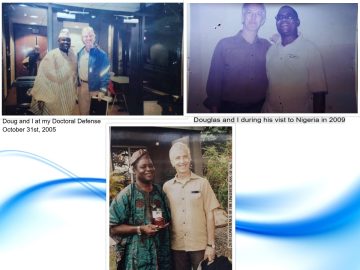Douglas Pulleyblank as I know him
Doug, whom I met for the first time in September 1999 revealed himself as a friendly individual and that continued throughout my stay in Vancouver and even after I returned to Nigeria. During the Christmas break in December 1999, he had a party in his house for faculty members and Graduate students of the department. It was there that I first had Yorùbá meals of àmàlà, ẹ̀bà and ọbẹ̀ ewédú prepared by him and Anne-Marié in his home. They also treated us to Yorùbá music, thus making his home that night, my home away from home. That evening, he appeared in his agbada!
His closeness to me remained the same. In 2009, not only did he come to my office on his visit to Nigeria, but he honored me with a faculty lecture that he delivered at the Faculty of Arts, University of Lagos; an honor that is still being referenced today by my colleagues. On July 31, 2013, I had the opportunity to meet with him again at the 26th Conference of the Linguistic Association of Nigeria which was held at the University of Ibadan.
One known fact about Doug is his long-standing research interest in Yorùbá phonology. To the best of my knowledge, he has carried out more research in that area of the language than any of his contemporaries, Yorùbá linguists inclusive. He rekindled my interest in Phonology as he passionately taught all three phonology courses that I took with him: LING 401, LING 510, and LING 512. His thorough supervision of my first generals' papers in Phonology resulted in a co-authored paper published with him in 2018. Further, it was through the knowledge that I gained in his classes that, years later, I wrote a book that I titled: Demystifying Optimality Theory: A Pedagogical Approach which was published in 2020. As a member of my doctoral dissertation committee, I equally benefited immensely from his input at every stage of writing the drafts of the dissertation.
Doug is a compassionate and understanding faculty. Indeed, in my six years and three months of interaction with him, he demonstrated a high degree of humility in his relationships with his colleagues and students. He relates freely with his supervisees and brings them up at the pace that each of them can move and will not stumble. He is very accessible and willing to assist with everything at his disposal, including financial support. When he became aware that I was not absorbed back at the University of Ilorin upon returning to Nigeria in 2005 and for eight months, I had no job, he was among those who gave me financial support! I also benefitted from his research grants as his Research Assistant.
Finally, and on a lighter mood, if I had the power, I would have asked the Ọọ̀ni of Ifẹ̀ or the Aláàfin of Ọ̀yọ́ to confer on you a chieftaincy title: Amèdèjelédè-àgbáyé ‘the one-who-has-knowledge-of-language-more-than-its-speakers-worldwide’. Doug, I wish you a peaceful retirement. The footprints of your scholarship and humanity at UBC and beyond will remain indelible in the sand of history.

Dear Ọládiípọ̀,
This writing was beautiful. Thank you. I remember when you first arrived and we brought you a few pots and pans and ustensile so that you could cook!! I had completely forgot that we cooked Nigerian food for thst party! You brought back many happy memories. What an amazing journey you have had. And now being a professor!! Wow!!
Hopefully we will meet again somewhere in west Africa
Anne-Marie